A signature Cary Magazine feature that each year introduces you to a handful of women who embody our own aspirations.
Here, our honorees share their stories and advice on taking risks, finding rewards, and working hard to better our world.
Lori Bush
Cary Town Council Member and Mayor Pro-Tem
Written by Amber Keister
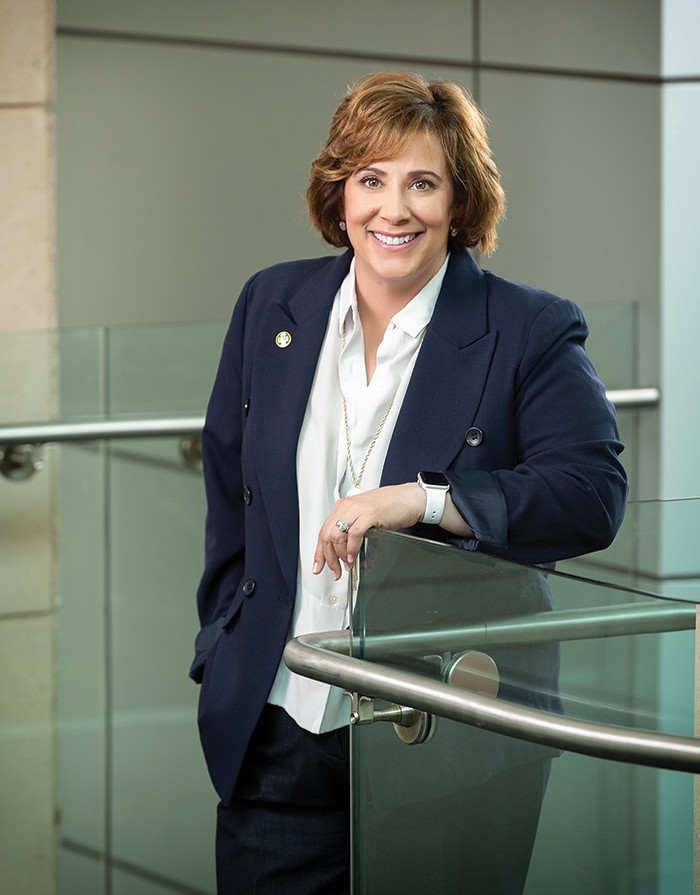
Despite her reputation as a tech trendsetter, Lori Bush is proudest of her impact on Cary families.
The Cary council member spearheaded the town’s adoption of paid parental leave, and since January 2017, town employees have been able to take six weeks of paid time off within a year of a child’s birth or adoption.
“I knew that paid parental leave — because I was lucky enough to have it — made a difference for families,” said Bush, 55.
The desire to serve her community has been with her since high school, when she attended Girls State. Through early adulthood she continued to volunteer — with the Boys and Girls Club, Big Brothers/Big Sisters and other nonprofits. In the late ‘90s, her political life took off when she became president of the Preston Village Homeowners Association. She served on various Cary boards and commissions and won her seat on the council in 2011.
“The idea of serving gets me out of bed in the morning. There’s something about being the closest level of government to the citizen that I truly love,” she said. “When someone calls, and there’s something I CAN do, I absolutely will.”

Lori Bush, who says she “loves heights,” recently climbed the Cary water tower with Mayor Harold Weinbrecht, fellow council members Ken George and Jennifer Robinson, and Robinson’s daughter.
Her other lifelong passion is technology – reflected in her degree in computer science and her job at Cisco Systems, where she creates technology solutions for learning and education.
In the mid-1980s, she excitedly bought her mother one of the first home computers. Her mom loved it, but only because she could type without getting out the correction fluid. Bush on the other hand, was thrilled that she could program the machine to sing when it was turned on and to say good-bye when shut off.
“I like bright, new, shiny things that make your life better,” said Bush. “I like to take hard, engineering things or difficult technology topics and digest them and share them in a way that the average person can understand.”
That ease with technology has been an asset on the town council, says fellow council member Don Frantz.
“She was the one that pushed us to use technology, to be more open to it, to be more trusting of it,” he said. “She had to spend quite a bit of time to educate council members and work with our staff to help educate the council.”
Frantz cites the Cary 311 system as an example where Bush pushed the council to adopt technology to improve service. Using database technology and well-trained staff, the program allows citizens to get to the proper department and the right person to address concerns quickly and efficiently.
The 311 system is one of several technology initiatives adopted by the Town of Cary that have led to its description as a Smart City. Others include water meters that alert town staff if there’s a leak, trash cans that notify a human that they need to be emptied, and robots in the sewers that test for opioids.
“The whole idea behind Smart Cities isn’t that we leverage technology,” said Bush. “It’s really about creating a connected community. It’s about taking all the systems that we’ve built, in silos originally, and pulling them together, so that we know more about the citizen and what they want.”
While Bush is proud of what she has accomplished in the last eight years on the council, she is aware that other issues take longer to solve. At the top of that list is affordable housing.
“We need to make sure that the people who teach our children, who serve our community, who make our food, pick up our trash, answer the phones, can live in the community they serve,” she said.
The issue hits home for Bush, who lived in subsidized housing as a child in St. Louis. When she was 7, her parents divorced, and for a time, she and her mother relied on government programs and the “kindness of strangers,” as Bush recalls.

For the first snow of every year, Lori Bush does a ride-along with a Cary snowplow driver. “I jump in the cab of the snowplow, and I Facebook-Live it,” she says.
Her early years informed, not only her compassionate nature, but also her drive to get things done and figure it out on the way. She encourages more women to follow her example and jump into public service, even if they think they don’t have time.
“I’ve always said ‘yes’ before I thought about whether ‘yes’ was the right answer,” she said.
When Bush was elected to the council, her son was in middle school and her daughter was in high school. Now, her daughter lives and works in Manhattan, and her son is in his final year of college.
She has also said ‘yes’ to nonprofits and causes near to her heart. These have included the National Multiple Sclerosis Society, the Hunt Library Technology Advisory Board and the National Association for Cybersecurity. Currently she is on the board of the N.C. Museum of Natural Sciences and serves with the East Coast Greenway Alliance.
Even with her full schedule, she makes time to be out in the community, attending festivals, climbing the Cary water tower, riding her bicycle — and documenting it all on social media.
“The best part of serving is to not just serve, but celebrate everything from a business opening and someone’s total life investment in our community to watching kids walk across the stage at graduation,” Bush said. “I’m privileged to be a part of it.”
Ravila Gupta
Council of Entrepreneurial Development
Written by Mary Cornatzer
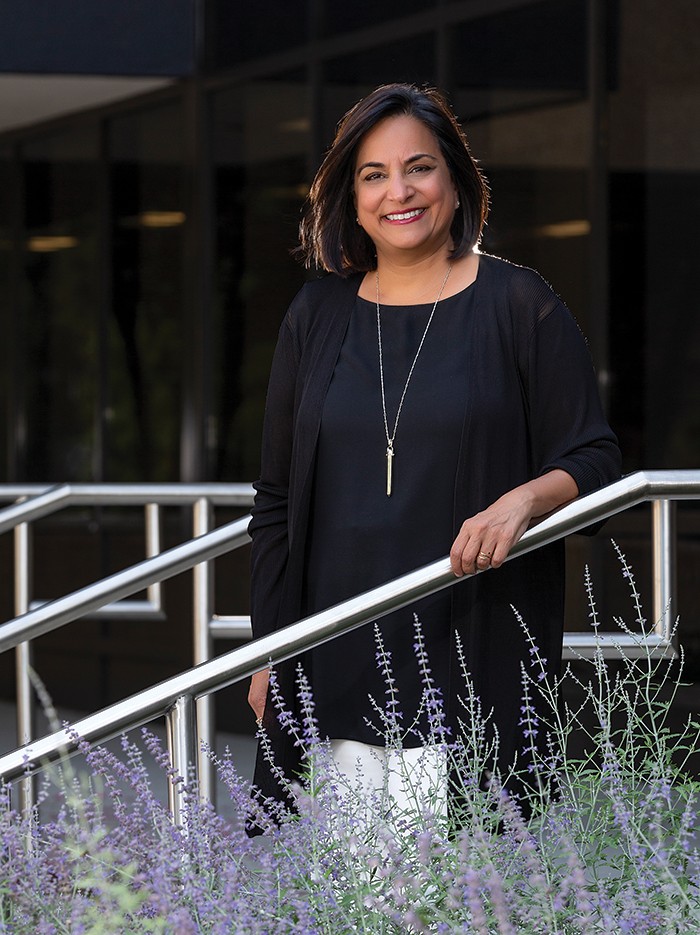
When Hurricane Florence blew through Raleigh last year, it canceled the Council for Entrepreneurial Development’s annual tech conference.
CEO Ravila Gupta took the disruption in stride and piggybacked that conference onto another event a few months later. It was a revenue-saving move that proved so popular, the two conferences are merged again for 2020.
This is just an example of what Gupta excels at — solving problems.
“I’m the happiest when there’s a challenge in front of me that I know absolutely nothing about,” Gupta said. “The thrill that I get from knowing that I have to do research, I have to figure it out, I have to talk to people. … That really energizes me.”
It was that, in part, that led her two years ago to take on the role of president and CEO of CED, which connects entrepreneurs with investors and the resources they need to accelerate growth.
She had a larger motive as well.
“I was at a point in my career where I really wanted to start focusing on what kind of impact I could make in a community,” she said. “I have amassed a great deal of skills, experiences, perspectives, a lot of development as a leader, and I just thought it was my time to give back.”
Since joining CED, Gupta, 56, has overseen its move from Durham to a more central location in Research Triangle Park. More important, she is developing a model to make CED sustainable. It will be a shift in the way the organization operates. Without going into specifics, Gupta says CED will move away from its membership model and work to increase engagement within its network — a strategy that she expects will lead to more funding.
CED’s core mission, supporting entrepreneurs, will not change, she stresses. Since 2014, CED’s Connections to Capital program has helped startups raise $57 million, while its mentoring program has served about 200 companies since 2010.
Patty Briguglio, who heads PFB Connect in Cary, recommended Gupta to CED after its longtime CEO, Joan Siefert Rose, decided to leave.
Briguglio calls Gupta “one of the smartest, most impressive women I know.”
“She has really come into CED and made major changes but without leaving a trail of bodies in her wake,” Briguglio said. “She’s been very thoughtful and inclusive in how she went about this. … She took the entire organization and pulled it apart piece by piece and then put it back together, but did so in a way that fully engaged the stakeholders, the staff, the board, volunteers, so that the final product was fully embraced.”
Gupta says the job, which is filled with meetings and strategy sessions, uses skills she picked up first around the dinner table with a father who was a professor of engineering — “Our dinner conversations were usually some science-based inquiry” — and then developed as an engineer in Canada and later at the N.C. Department of Environment and Natural Resources. She honed her skills with a law degree from N.C. Central University and nine years as legal counsel and then president of Umicore USA, a Brussels-based materials company.
The law degree came from a desire to round out her thinking. “I’m always looking for ways to approach problems with a different mindset,” she explained.
“It’s really powerful to be able to think both at the same time as an engineer and a lawyer. The engineer is going to look to solve the problem, and the lawyer is going to look to see what can go wrong. … Sometimes the two brains play against each other, but it gives me the ability to find a richer solution.”
At no time did it occur to Gupta that she couldn’t pursue an engineering career or couldn’t go to law school while raising a child (her son is 29 and works for a venture capital firm in London). Again, she credits her father’s influence. “It was just, women can do this, so why not.”
That mindset came in handy in 2014, when she represented Umicore at a CEO roundtable on foreign investment with President Barack Obama.
“I walked around the table and they had name place cards, and I’m looking for my name and I sit down in my seat and I look over and there’s a seat with no name and a blue folder and a cup of green tea, and I’m like ‘Oh my God, I am beside him.’ … And then I started thinking to myself, ‘Why not?’ … The processing of it was, OK, I’m the only woman. These are all major CEOs from major companies from around the world. That’s fine, I’ve got it.”
Now, as a woman and a minority in fields long dominated by men, Gupta says she is often asked to speak about her journey.
“It never gets tiring,” she said. “I think that I’ve really been lucky that I’ve had a tremendous amount of experiences in my career, and some of them I’ve put myself right in the middle. My favorite saying is, ‘Leap, and the net shall appear.’ So, I put myself in situations where I don’t know anything and I’m like, ‘I’ll figure this out.’ For that reason, I’ve had a lot of experiences that have made me grow really quickly, have shaped me, and that’s a message I can give to others: ‘Yeah, it’s scary, but you know at the end you’re gonna be better for it.’”
Vicky Serany
Owner, Southern Studio Interior Design
Written by Marine Elia
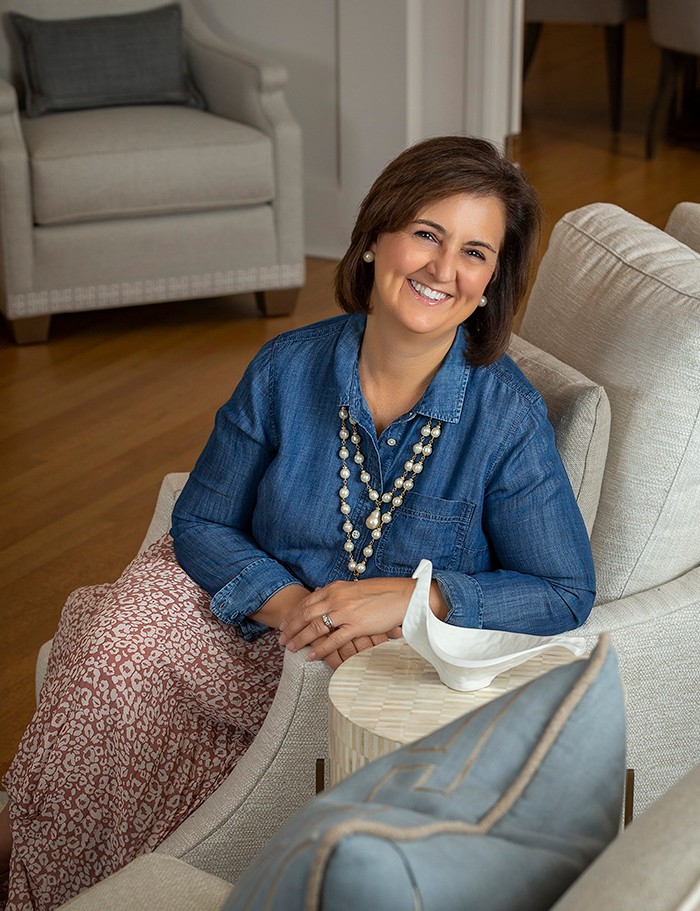
For someone who never envisioned starting her own business, Vicky Serany is quite the success story.
Before her business, Southern Studio, was praised by clients and featured in Southern Living magazine, Serany was a mom pursuing her passion for architecture. While raising her children, she went back to school to study interior design at Meredith College.
“When my youngest was in kindergarten, we used to sit around the kitchen table and do homework together,” Serany said.
In 2001, she volunteered to design an Apex home for the annual Triangle Parade of Homes, presented by the area’s home builders associations. Despite her limited budget, Serany earned an award for the home, and the builder invited her to help the homeowners add the finishing touches.
That confidence-boosting opportunity led Serany to establish her own interior design business with a focus on new construction. She worked alongside builders and developers to choose lighting, cabinetry, kitchen countertops and other aesthetic details.
When the Great Recession hit in 2008, Serany’s reaction was not to stifle her vision, but to expand it. By 2011, Serany had enough business to hire her first employee, allowing Southern Studio to expand into home décor and furnishings.
“I just followed my gut and knew that the timing was right — it paid off,” she said. “I have really found that listening to your gut is your best guide.”
After a plethora of projects, Southern Studio developed a clientele with homes and vacation homes throughout the country. Houses from Denver to New York boast Southern Studio’s “liveably sophisticated” stamp. Serany and her team have also won numerous awards by industry organizations such as ASID, the American Society of Interior Designers.
Without diminishing her own accomplishments, Serany explains the success of the firm would not be possible without her five-person team.
“This business is not named after me for a reason. It’s a collaborative design studio,” she said.
Teamwork is highlighted in a bold way at Southern Studio. Written on a kitchen wall in the firm’s Cary office are clusters of words and phrases such as “humbly confident” and “thoughtful.” These principles govern the business — from working on projects to selecting clients.
Even Serany’s philosophy on the inevitable missteps that come from experimenting with custom design relates back to the values on the wall.
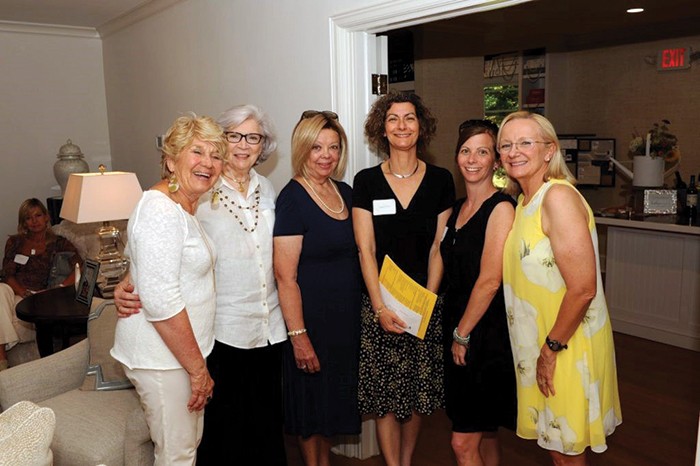
In 2018, the Cary Women’s Giving Network held its annual award presentation at Southern Studio Interior Design in Cary. Sheila Ogle, Alice Watkins and Lisa Banks with the philanthropic group, Jennifer Weiss and Erin Witcher of the Hope Center, and Alisa Wright Colopy of Fit & Able Productions, celebrate.
“Mistakes are going to be made,” Serany said. “But even if it’s a costly one, you don’t beat each other up. You figure out why the mistake was made, and identify what the root cause of it was, so that it’s not made again.”
As a values-driven business, Southern Studio is committed to giving back to the community. When selecting clients, the firm chooses individuals who share in the firm’s philanthropic outlook. Southern Studio often comes to support the causes its clients advocate for.
Karen Swoboda became a close friend of Serany after working with her on multiple renovations. When Swoboda was raising money for Habitat for Humanity, she asked her friend if Southern Studio would support the Blueprint Breakfast, the nonprofit’s largest fundraiser for Wake and Johnston counties. Serany enthusiastically agreed.
Vicky Serany has these tips for business owners:
- “Anyone who touches your business, make them feel extra special.”
- “When somebody gives you the opportunity, don’t let them down; work twice as hard and deliver twice the service.”
- “Stick with what you’re good at.”
- “Always do the right thing.”
- “Under-promise and overdeliver.”
“Vicky is constantly aiming to improve everyone’s life around her,” Swoboda said. “It’s in her DNA.”
Serany welcomes organizations to host events at the studio through the Southern Studio at Sunset Series. The firm invites charities to fundraise and design firms to teach continuing education at the studio.
“My priority is giving back,” Serany said. “We try to use the studio for the good of the community, and that’s been one of the most rewarding things that has come from the business.”
Southern Studio’s perspective on community service extends to mentoring young designers. When Serany takes in a new college intern or speaks to high-schoolers in interior design programs, she reminds them of the hard work expected of people in the field and encourages them to strive towards their goals.
“My favorite thing to ask young people is, ‘What is your dream? What do you want to do?’” Serany said. “You have to have those goals. If you don’t have a dream, you don’t have a direction to aim for.”
When it comes to advising small-business owners, Serany says tenacity is vital for success.
“It’s pure determination and just plowing through and not letting failures set you back. Because there will be failures along the way,” she said.
That dedication to hard work is balanced by another key element — being invested in clients and their happiness.
“I always tell homeowners that we leave a piece of our heart with every project,” she said.
Catherine Truitt
Chancellor of Western Governors University N.C.
Written by Lea Hart
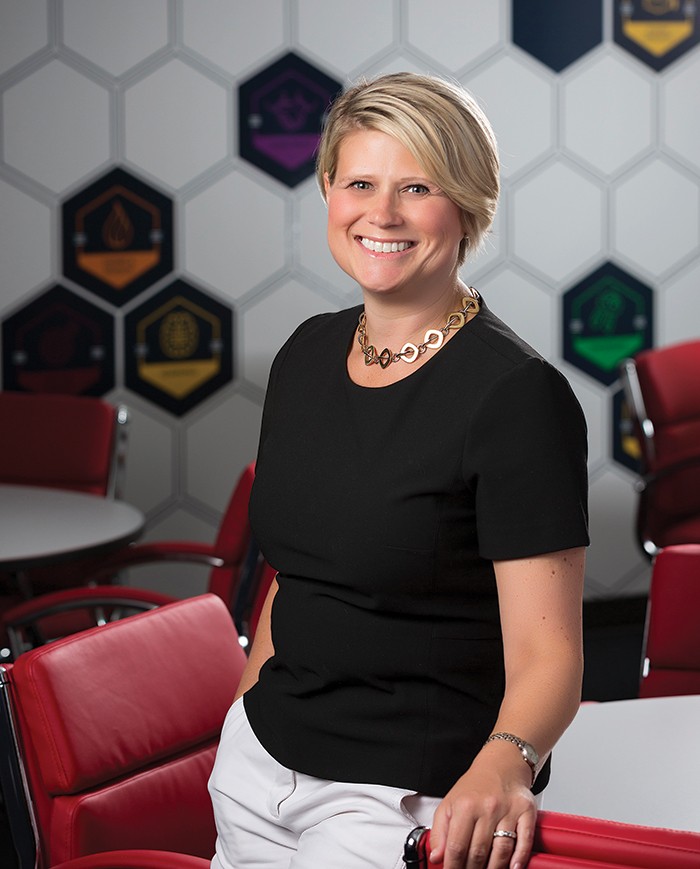
Catherine Truitt has a favorite expression: When you have a new opportunity, say ‘Yes,’ and then figure out how you’re going to do it.
“Never judge an opportunity in the moment,” Truitt said. “Do your research, but don’t let your fears hold you back from grasping an opportunity.”
It’s what she’s done throughout her career, and had she not, Truitt might not be chancellor of Western Governors University (WGU) North Carolina. The former high school English teacher said ‘Yes’ to the opportunity to consult on education at the national level, when North Carolina’s governor sought a high-level adviser, and finally, when she was asked to become chancellor.
“That is what I have done every step of the way,” she said.
Married to a Navy man, Truitt moved frequently in the couple’s 25 years of marriage, and she taught in a variety of locations, including in the United Kingdom for four years. They settled in North Carolina 10 years ago and call Cary home.
She’d taught at West Johnston High School for about three years, when she joined the International Center for Leadership in Education, a consulting firm that specializes in mentoring teachers, administrators and school officials, often in underperforming school districts. In her role — often called a “turnaround coach” — Truitt traveled the country helping school districts integrate new curriculum standards and sharing best practices with teachers and principals.
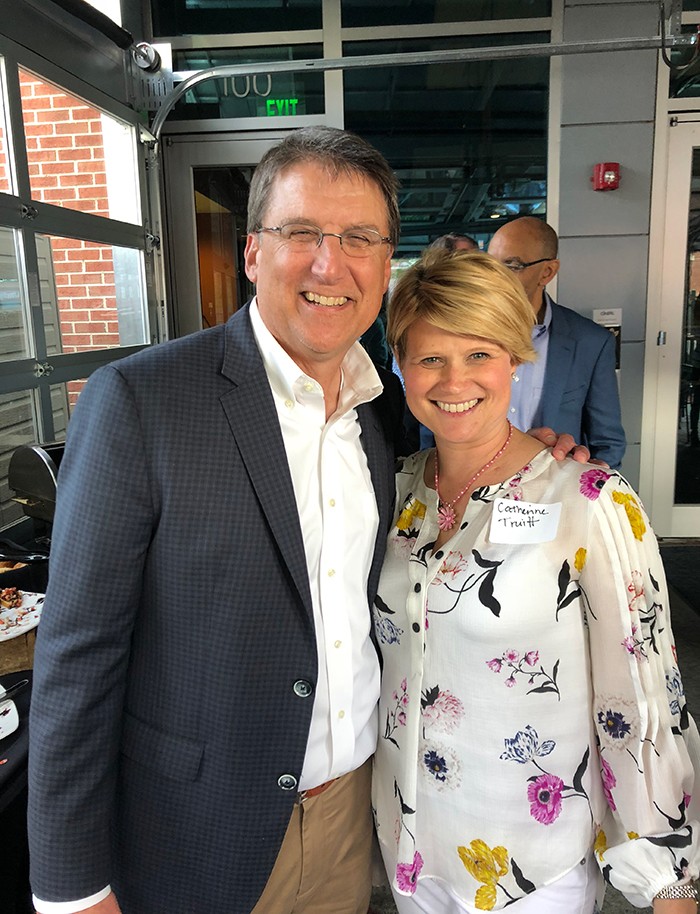
Former Gov. Pat McCrory and WGU Chancellor Catherine Truitt pose at an event in June 2018.
In 2015, Governor Pat McCrory’s office came calling, and Truitt was appointed a Senior Education Advisor to the Governor. When McCrory left office, Truitt went to work for the University of North Carolina System as assistant vice president for academic and university programs.
It was while McCrory was in office, however, that talks began to bring WGU to North Carolina. That work continued after the 2016 election, and the following year, Truitt received a call from WGU asking if she’d be interested in serving as chancellor.
WGU North Carolina launched in 2017 with 1,000 students, and today the nonprofit university has 3,200 N.C. students enrolled. Unlike at traditional four-year university, WGU students pursue their degrees entirely online. There is no campus, no athletics, nor funded faculty research.
“Our mission is to expand access to higher education across North Carolina,” Truitt said.
Access, she points out, can mean different things. In rural North Carolina, access may mean pursuing an online degree because there’s not a quality higher education option within driving distance. Or it could mean a father, who can’t quit his job to pursue a full-time degree and still provide for his family, can take courses online while he continues to work.
WGU offers a degree opportunity to adults looking to return to school, those who have finished community college with an associate degree, and to veterans, active military and their spouses.
Affordability also figures into access, Truitt says. Tuition at WGU North Carolina is a flat-rate $6,500 per year. If a student takes more courses in a semester, their tuition wouldn’t increase, as it would at many universities. According to the WGU website, to earn a BS in Business Management at WGU would cost $25,800. Whereas at the University of Phoenix, an online university where students pay per credit, the cost would be $49,800.
National student debt is close to $1.6 trillion, Truitt says, citing data from the Federal Reserve. WGU addresses the student debt crisis with affordable tuition and a rich financial aid program, offering $240,000 in scholarships already in 2019 and working to add tuition assistance. A recent agreement with the USO of North Carolina will enable WGU to offer eight scholarships to members of the military beginning this fall.
This concept of access via affordability is something Truitt is passionate about. It’s a big part of why Truitt wakes up excited to come to work each day.
“Our whole team stays motivated knowing what it means not just to the graduate, but to their whole family when someone gets a degree that leads to a promotion,” she said.
Truitt shared WGU statistics that show the average return on investment for a WGU degree is an $18,000 per year pay increase for the degree recipient.
“A lot of these students are first-generation degree-recipients,” she said. “The work that I’ve done with the underserved makes that so important to me.”
WGU and the students it serves aren’t Truitt’s only passion. She is a breast cancer survivor, diagnosed while working for the governor’s office. She began her job with the UNC System the same day she started radiation treatments.
It’s made her an advocate for self-examination. Truitt found the aggressive type of breast cancer during a self-exam and early detection meant it was treatable. She now has a less than 1% chance of recurrence.
Truitt’s three children, one in elementary, one in middle and one in high school, her husband, and her work on two nonprofit boards — the Tammy Lynn Center and the Nurse Family Partnership — fill the rest of her time. She loves to cook and does so almost every night, and has a few unique interests such as Scandinavian mystery fiction.
Truitt said she feels lucky to live in Cary after years of moving frequently, and is thankful for the community’s diversity and a group of mom friends that span her children’s three schools.
“I just can’t think of a better place to raise your family,” she said.
Shelley Westman
Principal Partner at Ernst & Young
Written by Jennifer Buehrle Williams
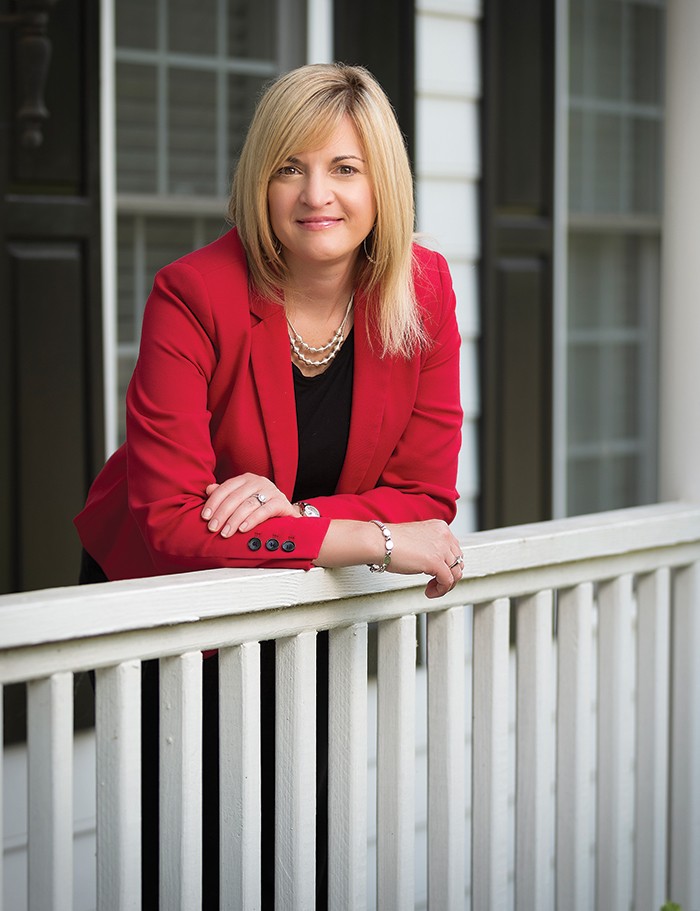
If you had asked Shelley Westman, Principal/Partner at EY (Ernst & Young) in Risk and Cybersecurity, even 10 years ago, if she would be recognized as a Woman of Western Wake or a Woman of Influence, or a Leader in Diversity Champion, she would have balked.
“Most of my career I paid zero attention to the fact I was a woman. I worked hard, expected to be promoted on merit, and I was,” explained Westman. “I wasn’t interested in joining women’s groups; I just didn’t consider gender at all.”
The Cary resident has done a 180-degree turn on her views towards championing women in the workplace, specifically women in the cybersecurity and STEM fields.
From penning articles with hashtags like #SheBelongs, to interviews with national news outlets and speaking at events from international cybersecurity consortiums to local middle-school classrooms, she is on a crusade to promote women in cybersecurity — a field that is experiencing a huge talent shortage. According to Cybersecurity Ventures, there will be 3.5 million unfilled cyber jobs by 2021.
“I hear a lot from young girls that this just isn’t a career path they knew about. And if they don’t see something or someone, they can’t imagine it for themselves. I want to change that. We need to change that,” said Westman.
Her fearless determination in becoming a leader in a field with few women isn’t surprising if you look at her history.
Growing up in Albany, N.Y., her dream was to become a lawyer. From the age of nine she was singularly focused on that goal.
“My cousin, who was a lawyer, would come up from the city and pull out gobs of money and talk about all the goodies his clients gave him and how much money he made per hour,” said Westman with a laugh. “I was starry-eyed, and every single thing I did as a kid was to get me into law school.”
- Never re-use passwords…ever. Never link passwords across sites (we know you do it).
- No easy answers. Make up the answers to security questions. It’s too easy to find the real answers on Google.
- Make sure you check your credit report once (or twice) a year, and monitor all credit card and bank statements. Skimmers will test things with small purchases.
Source: Shelley Westman
More than 10 years later she arrived in Chapel Hill ready to become a legal eagle. While she did practice for a few years after graduation, she found she hated law. But using her legal education, she broke into the business world at IBM where she ended up in 12 roles over 17 years. Many of those jobs were first-of-a-kind roles where she was tasked with figuring out how to get things done — and she did.
Getting moved into IBM’s cybersecurity division seven years ago was another new field, and she had a lot to learn.
“I was one of those who would change my password eight times in a row to get back to my original password,” said Westman. “That’s very bad.”
She fell in love with the fast-paced work and the excitement of matching wits with the bad guys. She warns that hackers can’t be prevented from getting access to personal data, but her team focuses on preparing for, containing and eradicating a breach once it has happened.
According to the Breach Level Index there were more than 2.6 billion data breaches in 2017. That’s seven million records a day or 214 records every second.
“In the cybersecurity world we say there are two kind of companies: those who have been breached and those who know they have been breached,” said Westman.
When she learned women made up only 10% of cybersecurity experts, Westman knew she had to act.
“I don’t know if it was because that number was so shockingly low or knowing that more than 50% of college grads are women and they weren’t choosing this field that I loved, but it got my attention,” she said. “I decided if I wasn’t going to do something, who was?”
She joined her first women’s group — actually she started it. She formed WISE (Women in Security Excelling) at IBM with 200 members four years ago. Today, there are more than 1,200 members. At EY, she continues to match wits with the bad guys and to show women what is possible in STEM fields. And young women are listening to her and responding. In June, she was a panelist at the inaugural Young Women in STEM Conference, which was organized by Ive Jones, a 17-year-old girl from Apex.
Today her motivation comes, not from a wad of money, but from knowing she is positively impacting the lives of others.
“To hear from someone who says, ‘Wow, you changed the course of my career. I didn’t know this was a possibility for me,’ that is what is really rewarding,” said Westman.



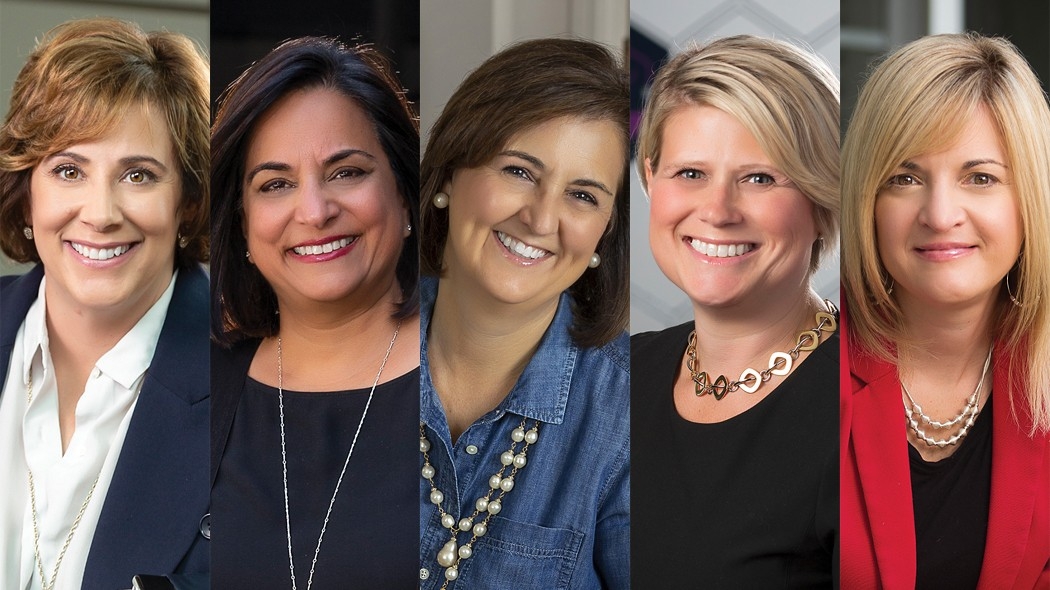



Thank you for including Chancellor Catherine Truitt among the Women of Western Wake. She is an inspiration to her staff and a true advocate for affordable access to higher education. WGU North Carolina recently signed a memorandum of understanding with Wake Tech that will make it easier for their graduates to transfer to WGU, get tuition discounts, and apply for community college partner scholarships.